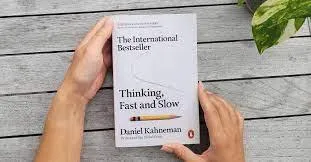
Blog

Understanding the Mind: Exploring Daniel Kahneman's "Thinking, Fast and Slow"
Daniel Kahneman, a Nobel laureate and esteemed psychologist, has made a significant impact on the field of behavioral economics and decision-making through his groundbreaking research. In his seminal work, "Thinking, Fast and Slow," Kahneman provides profound insights into the human mind's dual systems and their influence on our judgments and decisions.
Unveiling Dual Systems: The Fast and Slow Thinking
Kahneman introduces the concept of dual cognitive systems: System 1 and System 2. System 1, often referred to as "fast thinking," operates automatically, rapidly, and with little effort. It's intuitive, emotional, and prone to biases. On the other hand, System 2, known as "slow thinking," is deliberate, analytical, and involves more conscious effort and reasoning.
This dual-system framework helps us understand how our minds process information and make decisions. System 1 guides our quick, instinctive responses, while System 2 takes a more thoughtful and deliberate approach.
Understanding Cognitive Biases
In "Thinking, Fast and Slow," Kahneman delves into the various cognitive biases that influence our decision-making. He explains that these biases are often products of System 1's quick and intuitive judgments. These biases can lead to errors in reasoning and judgments, affecting how we perceive and respond to different situations.
One of the notable biases discussed is the "availability heuristic," where we tend to overestimate the probability of events based on their availability in memory. This bias can sway our judgments and decisions, often leading us to incorrect conclusions.
Anchoring and its Impact
Another significant concept elucidated by Kahneman is "anchoring," a cognitive bias where an initial piece of information (the anchor) influences our subsequent judgments and decisions. Anchors can be arbitrary or misleading, yet they exert a powerful influence on our thought processes.
Kahneman's research in "Thinking, Fast and Slow" highlights how anchoring affects negotiations, financial decisions, and various aspects of our lives. Understanding this bias can help us become more aware of how initial information can unduly sway our subsequent choices.
Loss Aversion and Prospect Theory
Kahneman, along with his research partner Amos Tversky, developed the prospect theory, a significant contribution to behavioral economics. Prospect theory explains how people evaluate and choose between options involving risk, demonstrating that individuals are more averse to losses than they are inclined towards gains.
This insight into loss aversion has far-reaching implications for economics, finance, and public policy. It helps explain behaviors such as risk aversion and suboptimal decision-making, challenging traditional economic models.
Attribution and Conclusion
Daniel Kahneman's research, as presented in "Thinking, Fast and Slow," offers an in-depth exploration of human cognition and decision-making. It sheds light on the intricate interplay between our intuitive, rapid judgments (System 1) and our more deliberate, analytical thinking (System 2). Understanding these dual systems and the biases that accompany them is critical in improving decision-making and achieving a more accurate perception of the world.
Through Kahneman's extensive research and contributions to the field of psychology and behavioral economics, we can appreciate the profound impact his work has had on our understanding of the human mind and behavior. "Thinking, Fast and Slow" serves as a beacon, guiding us towards a deeper comprehension of how we think, decide, and ultimately shape our lives.
To learn more about the services we offer, please click here. To get in touch with me, please click here or give me a call at (617) 281-3215.

Understanding the Mind: Exploring Daniel Kahneman's "Thinking, Fast and Slow"
Daniel Kahneman, a Nobel laureate and esteemed psychologist, has made a significant impact on the field of behavioral economics and decision-making through his groundbreaking research. In his seminal work, "Thinking, Fast and Slow," Kahneman provides profound insights into the human mind's dual systems and their influence on our judgments and decisions.
Unveiling Dual Systems: The Fast and Slow Thinking
Kahneman introduces the concept of dual cognitive systems: System 1 and System 2. System 1, often referred to as "fast thinking," operates automatically, rapidly, and with little effort. It's intuitive, emotional, and prone to biases. On the other hand, System 2, known as "slow thinking," is deliberate, analytical, and involves more conscious effort and reasoning.
This dual-system framework helps us understand how our minds process information and make decisions. System 1 guides our quick, instinctive responses, while System 2 takes a more thoughtful and deliberate approach.
Understanding Cognitive Biases
In "Thinking, Fast and Slow," Kahneman delves into the various cognitive biases that influence our decision-making. He explains that these biases are often products of System 1's quick and intuitive judgments. These biases can lead to errors in reasoning and judgments, affecting how we perceive and respond to different situations.
One of the notable biases discussed is the "availability heuristic," where we tend to overestimate the probability of events based on their availability in memory. This bias can sway our judgments and decisions, often leading us to incorrect conclusions.
Anchoring and its Impact
Another significant concept elucidated by Kahneman is "anchoring," a cognitive bias where an initial piece of information (the anchor) influences our subsequent judgments and decisions. Anchors can be arbitrary or misleading, yet they exert a powerful influence on our thought processes.
Kahneman's research in "Thinking, Fast and Slow" highlights how anchoring affects negotiations, financial decisions, and various aspects of our lives. Understanding this bias can help us become more aware of how initial information can unduly sway our subsequent choices.
Loss Aversion and Prospect Theory
Kahneman, along with his research partner Amos Tversky, developed the prospect theory, a significant contribution to behavioral economics. Prospect theory explains how people evaluate and choose between options involving risk, demonstrating that individuals are more averse to losses than they are inclined towards gains.
This insight into loss aversion has far-reaching implications for economics, finance, and public policy. It helps explain behaviors such as risk aversion and suboptimal decision-making, challenging traditional economic models.
Attribution and Conclusion
Daniel Kahneman's research, as presented in "Thinking, Fast and Slow," offers an in-depth exploration of human cognition and decision-making. It sheds light on the intricate interplay between our intuitive, rapid judgments (System 1) and our more deliberate, analytical thinking (System 2). Understanding these dual systems and the biases that accompany them is critical in improving decision-making and achieving a more accurate perception of the world.
Through Kahneman's extensive research and contributions to the field of psychology and behavioral economics, we can appreciate the profound impact his work has had on our understanding of the human mind and behavior. "Thinking, Fast and Slow" serves as a beacon, guiding us towards a deeper comprehension of how we think, decide, and ultimately shape our lives.
To learn more about the services we offer, please click here. To get in touch with me, please click here or give me a call at (617) 281-3215.
